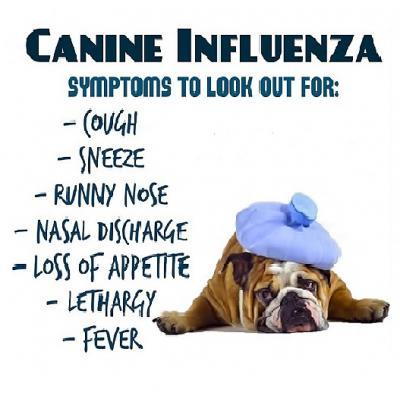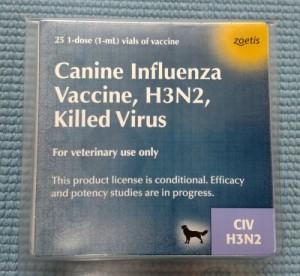Canine Influenza Virus - H3N2
- posted: May 31, 2017
The Canine Influenza Virus - H3N2
by Dr. Christa Young, DVM, Bellalago Veterinary Hospital
The Florida Department of Agriculture Division of Animal Industry, USDA Animal & Plant Health Inspection Service, and the University of Florida Veterinary Teaching Hospital today (5/30/17) announced confirmed cases of Canine Flu caused by H3N2 canine influenza virus. Many of the cases required hospitalization in infectious disease isolation units.
This virus is severely contagious being passed by virus particles in air droplets through sneezes and coughs up to 20 feet away! The virus can even survive for a short period (12 to 24 hours) on objects and people, making exposure to infection super easy.
 Dogs will cough frequently, have high fevers, sneezing, and discharge from the nostrils lasting 2 weeks. These symptoms can quickly progress to life-threatening pneumonia.
Dogs will cough frequently, have high fevers, sneezing, and discharge from the nostrils lasting 2 weeks. These symptoms can quickly progress to life-threatening pneumonia.
Who's at risk? Dogs that lead social lifestyles - visiting dog parks, attending dog shows, agility classes or obedience classes, dogs that board or groom, dogs at a shelter, rescue group dogs, and dogs going to a pet hospital. Cats can catch this flu too!
What is your Bellalago Veterinary Team doing? We are tightening our biosecurity measures until the outbreak resolves by asking owners of coughing, sneezing, nose discharge dogs or cats to call before coming to our hospital. These patients will be taken through a back door into a designated exam room to reduce exposure of other animals. Your pet nurse and veterinarian will be wearing infectious disease gowns, shoe covers, and exam gloves while interacting with your pet. The designated exam room and hallway will receive additional disinfection. Your pet will be treated and samples collected within the exam room, then checkout will occur in the exam room too (remember, if your pet had the virus you can be a source of infection to other dogs and cats).
What tests and treatments should I expect? We will prepare a test and treatment plan for your pet that will include:
1. Throat and nose swabs to test for canine flu viruses (takes 1-3 days for results)
2. Complete blood count to look for signs of pneumonia or septic blood
3. Organ function and electrolyte blood profile to address problems like dehydration or damage to the liver & kidneys
4. Possibly chest x-rays, but this could contaminate the x-ray area.
5. Urine test to evaluate hydration and stress on kidneys
6. Antibiotic and anti-cough injections
7. Subcutaneous (under the skin) fluids therapy for mild dehydration.
8. Antibiotic and cough suppressant pills
9. Nutritional support through a recovery diet
10. Recommendations that all dogs and cats in your home be isolated from others for 4 weeks
11. Watch other pets at home for signs and call if seen
12. A list of signs that indicate hospitalization is needed
13. Referral to a specialty center or University of Florida Small Animal Teaching Hospital if hospitalization needed due to the level of isolation required and 24-hour care for these critical patients.
14. Instructions for disinfecting at home
Testing and out-patient treatments are easily over $600 depending on the size of patient, and ICU contagious disease hospitalization for flu patients with bad pneumonia will likely be over $2500!
 Is this preventable? Yes, for the most part. There is a vaccine that can reduce risk, but no vaccine provides 100% protection from exposure - they help the immune system kill invading virus particles, but do not act like a force field. Your pet will need two vaccines 3 weeks apart to provide protection. Even pups as young as 8 weeks old can be vaccinated! Although we routinely carry the Dog Flu H3N8 vaccine, we have rush-ordered doses of the H3N2 strain to start protecting at-risk dogs. Please call to schedule H3N2 flu vaccination if your dog is at-risk. Please be aware that if your dog was exposed the week before the flu vaccine is given, they could still get sick. Vaccines take a few days to get the immune system ramped up. Prevention of an initial vaccine with exam and the 3-week booster is a fraction of the cost - think $100 or less versus $600 to $2500! [We now believe the total cost to vaccinate will be $68 for both doses including the required exam.]
Is this preventable? Yes, for the most part. There is a vaccine that can reduce risk, but no vaccine provides 100% protection from exposure - they help the immune system kill invading virus particles, but do not act like a force field. Your pet will need two vaccines 3 weeks apart to provide protection. Even pups as young as 8 weeks old can be vaccinated! Although we routinely carry the Dog Flu H3N8 vaccine, we have rush-ordered doses of the H3N2 strain to start protecting at-risk dogs. Please call to schedule H3N2 flu vaccination if your dog is at-risk. Please be aware that if your dog was exposed the week before the flu vaccine is given, they could still get sick. Vaccines take a few days to get the immune system ramped up. Prevention of an initial vaccine with exam and the 3-week booster is a fraction of the cost - think $100 or less versus $600 to $2500! [We now believe the total cost to vaccinate will be $68 for both doses including the required exam.]
Pet Owner Resources:
A website about the Canine Flu - www.dogflufacts.com
The American Veterinary Medical Associations page on H3N2 - https://www.avma.org/public/PetCare/Pages/CanineInfluenza.aspx
The University of Florida’s Fact Sheet about the H3N2 virus - https://vetmed-hospitals.sites.medinfo.ufl.edu/files/2017/05/Info-for-Pet-Owners-on-Canine-Influenza-1.pdf
News Reports -
Orlando Sentinel - http://www.orlandosentinel.com/news/breaking-news/os-ap-florida-canine-influenza-0531-story.html
Click Orlando - http://www.clickorlando.com/pets/florida-confirms-first-cases-of-h3n2-dog-flu-in-state
CBS Miami - http://miami.cbslocal.com/2017/05/30/first-cases-h3n2-dog-flu-florida/
Location
Find us on the map
Bellalago Veterinary Hospital
3809 Pleasant Hill Rd
Kissimmee, FL 34746, US

